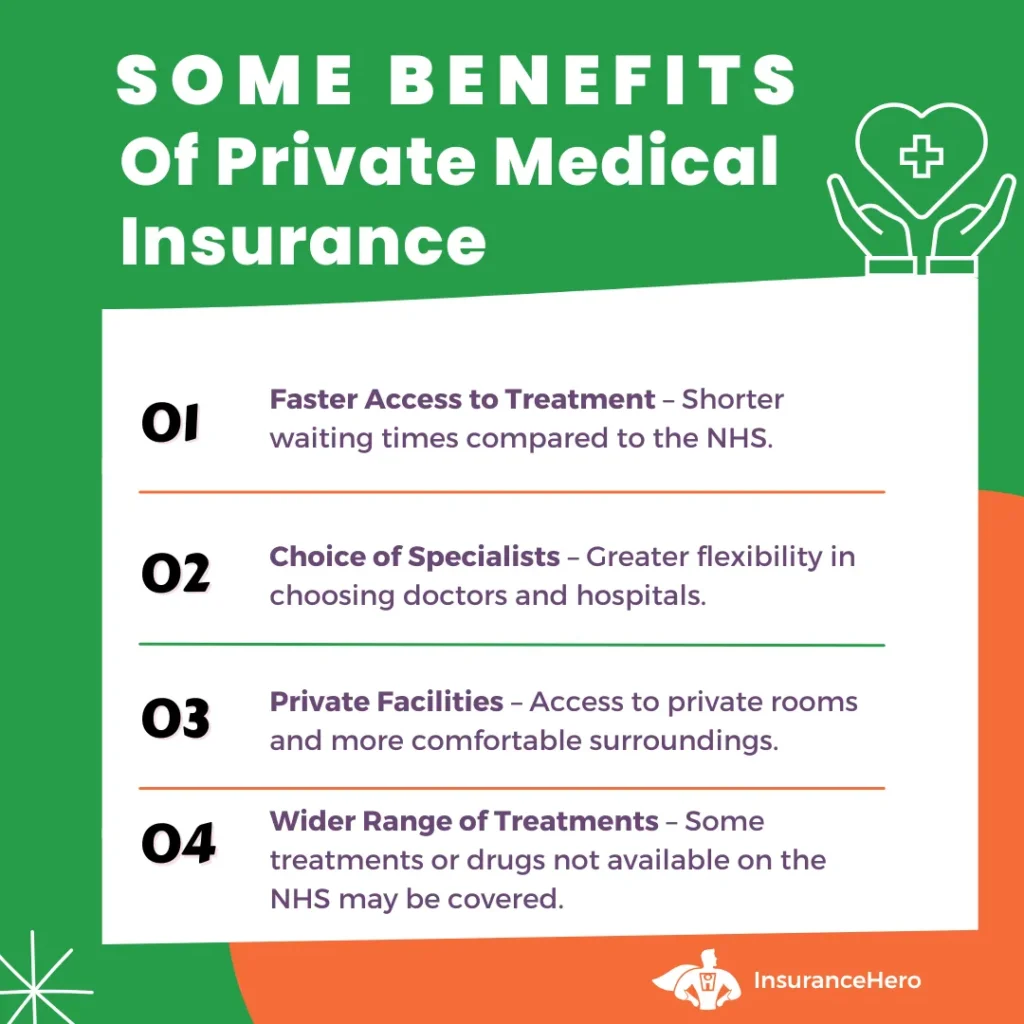What Is Private Health Insurance In The UK?

We are often asked the question: What is private health insurance? In basic terms, private health insurance (also known as private medical insurance or PMI) is financial protection that will cover the cost of private health care if you become sick, allowing you to get better.
A private health insurance policy works in conjunction with the NHS. It provides access to reduced waiting times, treatments that may only be available privately and a wider choice of clinics and hospitals.
As with other types of insurance, private health insurance involves paying a monthly premium to an insurer, who will then pay for private treatment covered under the policy’s terms.
The range of medical treatment available will differ depending on the type of policy and premium you pay.
Get A Low-Cost Health Insurance Quote Today At A Price That Suits You

Is It Worth Getting Private Health Insurance?
Is private health insurance worth it? Would you like to know what you can access with it?
Here are 15 potential benefits of having a private medical insurance policy in place:
- Access to medicines and treatments that may not yet be available on the NHS.
- A broader selection of drugs and treatments that will never be available on the NHS due to high costs.
- Little or no waiting lists for consultations
- Little or no waiting lists for treatments
- Access to private hospitals with private room facilities allows for improved relaxation.
- Access to private clinics and hospitals located in green and quieter locations.
- Higher standards of cleanliness mean lower infection risk, including MRSI.
- Consultant-led private medical care and entitlement to second opinions from medical experts.
- A superior and broader choice of food and drink.
- More flexible visiting hours compared to NHS hospitals.
- Private hospital staff often receive training to spend more time providing for people’s needs.
- A longer discharge time allows for a better recovery surrounded by medical professionals.
- Free access to satellite TV and radio.
- No parking costs.
- Private medical insurance (PMI) can cost less than your council tax bill.

Is There One Compelling Reason for Getting Private Health Insurance?
The NHS provides an excellent service and has been extensively praised and appreciated by the public following the Coronavirus pandemic.
Unfortunately, it has now become increasingly stretched as the priorities of COVID-19 have seen NHS waiting lists increase for investigative work like biopsies, blood tests, scans, and X-rays, often resulting in some patients’ conditions worsening.
Routine operations have also been pushed back or even suspended as the NHS has grappled with getting the pandemic under control. It will be some time before the NHS can operate at standard levels and timescales.
A recent analysis undertaken by the BMA estimates that the number of patients in the UK waiting over a year for medical treatment was over 436,000, the highest level since August 2007.
It is clear that if you become unwell and are reliant on an NHS hospital, the waiting time will be substantial, meaning you may be inconvenienced for a lengthy period.
Is private health insurance worth it? The uncertainty surrounding the NHS strengthens the case for taking out private medical insurance to receive priority treatment, and depending on the type of policy purchased, the cost may be less than you think.

Private Health Insurance – Three Important Considerations
Three essential considerations must be considered before deciding whether private health insurance is worth having in the UK, and we will run through these now.
1. Does the NHS cover all your requirements?
Did you know you will still need to use the NHS for Accident and Emergency and GP services? There is also no guarantee you will receive treatment quicker for serious illnesses if you have a private policy than directly using the NHS.
The NHS may cover your needs with its basic service, but private health insurance is especially useful for treating acute conditions.
These are sudden conditions with a limited treatment term. They differ from chronic conditions, like diabetes, that you may have to live with.
For acute conditions, you can refer to specialist treatment, enjoy low to no waiting times for treatment, and a wide choice of clinics and hospitals.
2. Do you already have health coverage through your employer?
It may be helpful to check if you or your family members already have access to private medical insurance through an employer, which you may have overlooked.
Even if no policy is available, it can be worth enquiring if the employer is prepared to implement a scheme for you and your colleagues.
Purchasing a policy for multiple staff members can bring costs down.
Even if you are leaving an employer, ask the insurer who runs the firm’s scheme about any continuation options.
This may allow you to maintain higher-quality private medical insurance cover at a lower premium.
3 Self-Insuring Options
Self-insuring means putting money into your emergency fund to use for medical matters. It is not essential to have insurance to get private healthcare treatment, and you can elect to pay bills personally. If you do not spend your fund, no money ebbs away, unlike premiums in a policy you never claim.
The downside to this option is that it takes a long time to build up a fund compared to the instant cover you get from paying monthly premiums into a policy.
Additionally, treatments and medical procedures can be hugely expensive, with a knee or hip replacement starting at £10,000 privately.
Compare Low-Cost Private Medical Insurance Today

I Want to Move Forward and Take Out a Policy – What Are the Next Steps
Suppose your answer is yes to private health insurance, and you decide to proceed with a policy. In that case, it is essential to understand the appropriate private cover options available, the critical features of a policy, factors affecting cost, and how to implement a policy.
We will cover these in detail now.
What does private health insurance cover?
You need to ask why you need private health insurance. Is it to cover every eventuality or for specific medical conditions?
Private medical insurance offers three types of coverage, and you should choose one that closely matches your circumstances.
Basic private health insurance
Basic cover will provide basic inpatient care at a private clinic or hospital. The definition of inpatient treatment is the need to use a hospital bed or stay overnight. It also takes in day-patient treatment where a bed is required for a day.
Medium level private health Insurance
Medium level healthcare insurance cover provides all the benefits of basic insurance. It also includes outpatient care where you do not need to stay overnight, consultation appointments, physiotherapy and psychiatry services and diagnostic tests.
Comprehensive private health insurance
Comprehensive private insurance includes all basic and medium private care insurance services, including outpatient treatment and additional treatments such as private ambulance, home nursing and alternative medicine.
As with other types of insurance plans, comprehensive cover typically includes add-ons that allow a policy to be tailored to a particular situation.

10 companies offering private health insurance in the UK
- Bupa
- AXA Health
- Aviva
- Vitality
- WPA (Western Provident Association)
- The Exeter
- Freedom Health Insurance
- General & Medical Healthcare
- CS Healthcare (now part of Bupa)
- National Friendly
What are the disadvantages of private health insurance?
Private healthcare insurance does not cover all conditions and treatments, which include the following:
- Emergency hospital treatment is covered by the NHS
- Travel insurance will be required to cover overseas treatment.
- Elective treatment is not covered, which is a treatment that you want but do not need.
- Lifestyle treatment, such as rehabilitation, may be triggered by drink or drug abuse.
- Chronic conditions which are ongoing treatment for incurable diseases like diabetes or HIV.
- Pregnancy care is not generally covered by private medical insurance.
- Any pre-existing medical conditions are not covered.
What should I be aware of before considering a private medical insurance policy?
If you have made a favourable decision regarding private health insurance and now wish to move forward with private cover, there are certain parts of a policy that you need to be aware of, and these include the following:
Excess considerations
Selecting a higher excess (you pay a specified amount towards a claim) can significantly lower private health insurance costs and make any claims more costly.
It is vital to consider whether you wish to cover everything or just an expensive one-off medical problem like a hip replacement.
Understanding any exclusions or restrictions
In addition to the exclusion of pre-existing conditions, there may be other situations where you cannot claim, such as pregnancy or cosmetic surgery.
Checking what is covered on a policy before you sign up is vital to avoid unpleasant surprises.
Add-on extras
You can tailor a policy and only pay for your required services. For example, you may decide that other cancer treatments or enhanced outpatient treatments would be desirable for any future situation.
It is vital to think carefully about why you need health insurance and structure the policy accordingly.
Understanding the private medical insurance claims process
It is essential to understand the claims process and timeframes involved if you need to claim, as these will vary between policies.
A typical claims process will be:
- Referral from your GP
- Register the claim with your insurance provider
- Your provider will check if you are covered for the claim
- If covered, your GP will refer you to a private clinic or hospital
How Much Does Health Insurance Cost?
Numerous factors affect the cost of health insurance, so any like-for-like comparison is difficult for health insurance policies due to many variables.
It depends on the insurance company and includes the following:
- Medical history—Private insurance does not cover pre-existing conditions. If you do have existing medical conditions, they indicate a risk of further problems in the future.
- Your lifestyle—How you live your life, such as your weight, smoking, drinking, and the amount of exercise you undertake, will all affect private health insurance premiums.
- Family history—Does your family have a history of any specific health problems? A history of these problems may indicate that you are at risk from the disease and can increase the cost of insurance.
- How old are you? Your age will directly affect the cover cost, as age typically increases the chance you will claim, making it more expensive as you age.
- Who is the cover for? Health insurance policies are flexible, allowing for coverage for individuals, families, or couples. It can be cheaper to have a sole policy rather than several different policies.
- Where do you live? Unfortunately, certain parts of the UK are associated with certain medical conditions; therefore, your postcode can affect the cost of insurance coverage.
How can I reduce the cost of private health insurance?
[/pullquote]There are several ways to help reduce the cost of private health insurance, and these include the following:[/pullquote]
- Limiting the hospitals and clinics available to you will reduce the cost of cover.
- Deciding on a higher excess when you make a claim will bring down the cost of insurance premiums.
- Adding a waiting period means you opt for your hospital treatment to go through the NHS if the waiting time is under six weeks. Once more than six weeks have passed, you can claim on your insurance and receive private treatment.
- A no-claims discount, like with car insurance, may help you receive a discount if you have not claimed on your health insurance for a long time.
- If you live in a healthy postcode, private healthcare providers may offer lower premiums than in other places.
I Am A UK Resident – How Can I Buy Private Health Insurance?
When you have decided whether it is worth getting private health insurance in the UK, it is vital to ensure that any policy closely aligns with your circumstances.
As mentioned, comparing plans like-for-like can be complex and involve many variables. To get a rough idea of whether health insurance will be affordable for you, research the approximate cost of basic, medium, or comprehensive insurance by comparing plans.
The next step is to contact Insurance Hero for an accurate quote. We will carefully review your requirements and ask questions to ensure that any policy quote aligns closely with your needs.
Further reading and external resources:
- https://www.bupa.co.uk
- https://www.bma.org.uk/media/1831/bma-guidance-for-patients-wishing-to-buy-private-medical-insurance-sept-19.pdf
- https://www.moneyhelper.org.uk/en/everyday-money/insurance/do-you-need-private-medical-insurance
- https://www.imperial.ac.uk/human-resources/benefits/live-well-work-well/bupa-eduhealth/
Steve Case is a seasoned professional in the UK financial services and insurance industry, with over twenty years of experience. At Insurance Hero, Steve is known for his ability to simplify complex insurance topics, making them accessible to a broad audience. His focus on clear, practical advice and customer service excellence has established him as a respected leader in the field.

